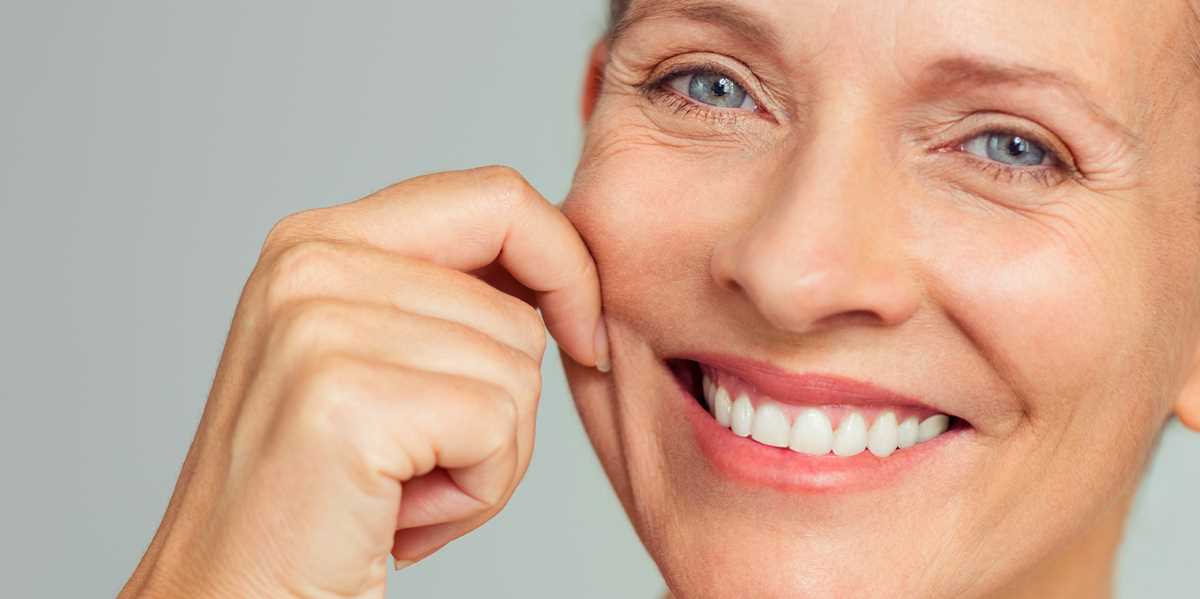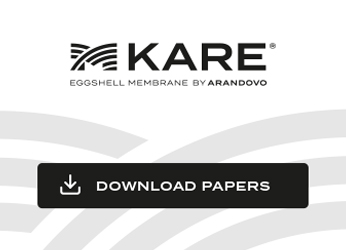Menopause marks the beginning of a new chapter in every woman’s life. As the window of fertility closes, the body undergoes significant changes, and the skin is no exception. This period can bring with it a number of dermatological challenges, from menopause and skin rashes to increased dryness and sensitivity.
On the Arandovo blog we are dedicated to help you understand these changes and offer practical tips to take care and maintain the beauty of your skin during menopause. That’s why we are going to explore in this post what menopause is, what happens to the skin during this process, how to address skin rashes that may arise, and what treatments and food supplements can help you maintain a radiant, healthy skin during menopause.

What is menopause
Menopause is a phase in a woman’s life when the ovaries stop producing eggs, and the production of hormones such as estrogen and progesterone declines. This natural process marks the end of fertility and usually occurs between the ages of 45 and 55. Menopause is characterized by a series of symptoms, including hot flashes, menstrual cycle changes, insomnia and, in many cases, skin alterations.
This process also stands out as a time of menstrual irregularities due to hormonal changes. The decrease in estrogen, for example, causes an acceleration of skin aging since the skin is regulated by hormones and these have a decisive influence on the thickness of the skin, its hydration and pigmentation, as well as a direct influence on cell renewal. Progressive hair loss is also very frequent at this stage of a woman’s life.
What happens to the skin during menopause
As mentioned above, during menopause, estrogen levels in the body decrease considerably. Estrogen is a key hormone in skin health, as it contributes to skin hydration, elasticity and thickness. Reduced estrogen levels can have several adverse effects on the skin:
Dry skin
One of the most common complaints among women during menopause is dry skin. Lack of estrogen can decrease the production of natural oils in the skin, leading to a feeling of dryness and flaking.
Skin itching
Dry skin can be especially uncomfortable and itchy. This can result in scratching, which in turn can cause irritation and even skin rashes.
Skin rashes
Some women may experience rashes during menopause due to dry skin, irritation or changes in the chemical composition of the skin. These rashes can vary in severity and may require specific treatment.
Skin spots
Another common problem during menopause is the appearance of skin spots, known as melasma or hyperpigmentation. These spots are caused by an increase in the production of melanin in the skin and usually appear in areas exposed to the sun.
Sensitive skin
The skin becomes more sensitive during menopause, making it prone to adverse reactions regarding cosmetic products and environmental factors such as sun and wind.
Menopause and skin rashes
Skin rashes can be a source of discomfort and concern for women in menopause. These rashes can vary in type and severity, some of the most common include:
Atopic dermatitis
This is a chronic skin condition which can cause itching, redness and rashes. The skin becomes extremely sensitive and can be triggered by factors such as stress and hormonal changes.
Hives
Hives are raised welts on the skin that may appear suddenly and cause intense itching. These can be an allergic response to foods, medications or other triggers.
Contact dermatitis
The skin becomes more prone to allergic reactions during menopause. Contact dermatitis occurs when the skin comes into contact with a substance that triggers an allergic reaction, such as chemicals in cosmetics or detergents.
Skin treatment during menopause
Treating your skin during this phase involves adjusting your skin care routine to suit your new needs. Fortunately, there are several approaches to take care of your skin during menopause and addressing skin breakouts. Here are some tips and treatments that may help you:
- Adequate hydration
Keeping skin well hydrated is essential during menopause. Use moisturizers rich in components such as hyaluronic acid and glycerin to retain moisture in the skin.
- Avoid irritants
If you have sensitive skin, try to avoid products containing irritating ingredients such as strong fragrances and alcohol. Choose mild, fragrance-free products instead.
- Sunscreen
Skin blemishes can worsen with sun exposure. Use sunscreen daily to protect your skin from UV damage.
- Dermatological treatments
If you experience severe skin rashes, it is important to consult a dermatologist. They can prescribe topical medications or specific treatments to address the problem.
- Feeding
Maintain a diet rich in antioxidants and omega-3 fatty acids that promote healthy skin from the inside out.
Nutritional supplements for your skin during Menopause
In addition to topical care, nutritional supplements can also play an important role in maintaining skin health during menopause.
Supplements with tissue repair capabilities such as those rich in amino acids from collagen and elastin, as well as precursors of glycosaminoglycan synthesis like hyaluronic acid and chondroitin sulfate, have been shown to play a key role in the regeneration of damaged skin.
Moreover, the anti-inflammatory and antioxidant properties exert a significant effect on skin protection by reducing the factors responsible for inflammation, as well as the free radicals generated by environmental pollutants and solar radiation itself.
Some supplements that may be beneficial include:
Collagen
Collagen is a protein that provides structure to the skin. Taking collagen supplements can help keep skin firm and elastic.
Omega-3
Omega-3 fatty acids, found in fish oil, have anti-inflammatory properties and can help reduce skin dryness and irritation.
Vitamin E
Vitamin E is an antioxidant that can protect the skin against free radical damage. You can get Vitamin E through supplements or foods such as nuts and seeds.
Zinc
Zinc is important for skin healing and can help reduce inflammation and rashes.
MKARE, your skin ally during menopause
At Arandovo, we continue to research MKARE, our 100% natural functional ingredient based on the egg membrane and obtained without the intervention of any chemical agent.
If there is something that makes MKARE stand out, it is being an innovative product with multiple benefits, not only for the skin, but also for your health in a single ingredient. MKARE is rich in collagen (I, V and X), hyaluronic acid, elastin, chondroitin sulfate, glucosamine and contains over 500 proteins that will help you in your daily life improving your skin significantly.
Our products are made to address skin challenges during menopause, providing hydration, protection and gentle care to keep your skin at its best.
As you’ve seen throughout this post, menopause can have a significant impact on the skin due to the hormonal changes that the body undergoes. Dry skin, rashes, sensitivity and blemishes are common problems that women can face during this stage of life. However, with proper care and the intake of nutritional supplements such as MKARE, you can maintain the beauty and health of your skin during menopause.
Remember that each person is unique, and what works for one may not be right for another. If you are having skin problems during menopause, it’s important to talk to a dermatologist or healthcare professional for a diagnosis and personalized treatment plan. In case you need more information about MKARE, don’t hesitate to contact us, we’ll be happy to help.




